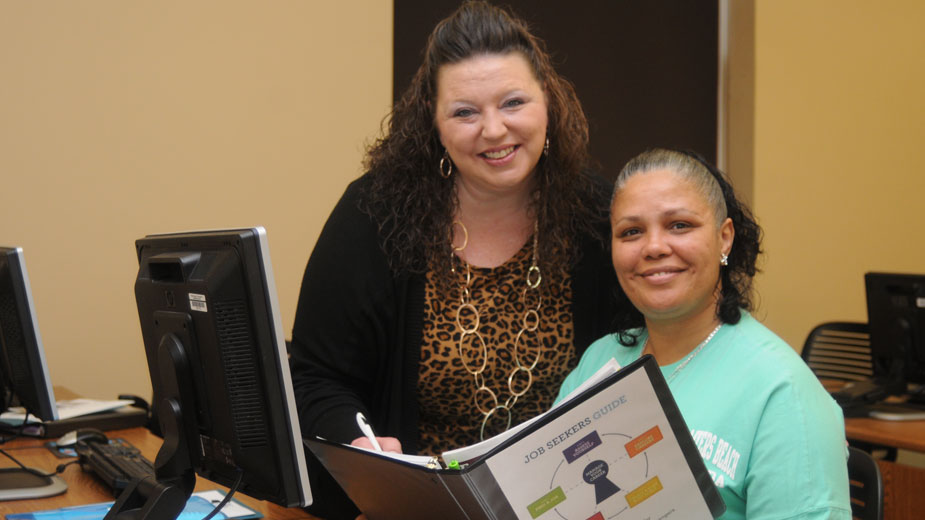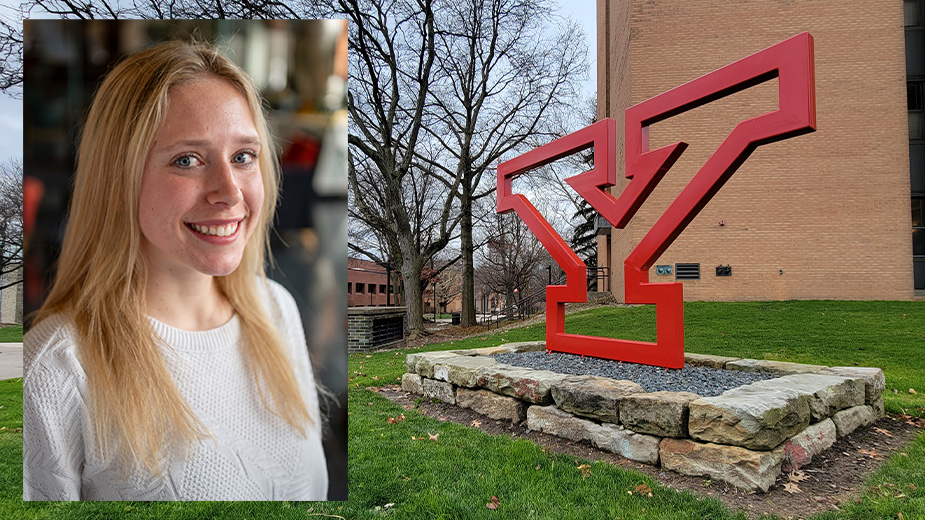Bryan Helps Job-seekers Break Down Barriers
YOUNGSTOWN, Ohio — Christy Bryan’s horrific car crash in 2005 was a life-changing moment that lasted six years.
The western Pennsylvania native was a homeowner, working full time as a licensed social worker and pursuing a master’s degree when the crash occurred.
Bryan suffered damage to her spinal cord and a cervical fracture. Her recovery was long and painful. Her doctor prescribed the painkiller OxyContin – 280 30mg pills every month. Within five years, she was taking 20 pills a day.
“Between 2005 and 2010, it was hell. I mean it was. It was bad. I was a full-blown addict,” Bryan says. “I got into a car accident, got hurt and was prescribed pain pills by my doctor. He gave me way more than I needed. I didn’t know that at the time.”
Clean and sober now for eight years, Bryan describes her downward spiral as a dark detour that has led her to YWCA of the Mahoning Valley as the transitional housing and job skills coordinator.
“I would have never chosen to go down the road I went down. I’m thankful for it now that I’m out of it. It helps me be a better case manager,” Bryan says. “I truly understand what they’re [clients] going through. You can have good case managers that are book learned. But there’s just something about having that firsthand knowledge.”
Bryan’s schooling came with costs and consequences to her and her career. Nearly a year after rehabilitation, she got a job as a waitress. But to manage the pain from her old injuries, she relapsed. In less than a year, she faced going to jail, fractured relationships and eventually lost her social worker license.
“I have two felonies for stolen property. I would be close to running out and when you’re facing that withdrawal and you know what that feels like, you will do anything not to feel that,” Bryan explains. “I’ve robbed my neighbors, robbed my mom. I’ve sold everything I owned. I rented my house out to drug dealers; I mean, I did it all just to not feel that withdrawal pain.”
Bryan has learned various coping mechanisms for pain in recovery, a daily discipline that she says has kept her from becoming a statistic in the nationwide opioid epidemic that hasn’t spared the region.
Beyond her addiction, Bryan faced similar employment barriers that are prevalent in the Mahoning Valley. While drug addiction receives more attention, it’s not the leading cause of jobs going unfilled, according to local experts and statistics.
“Drug use isn’t the main barrier to unemployment, contrary to what most people think,” says Diane Kohler, coordinator for employment skills and training programs at Mahoning Youngstown Community Action Program. “Barriers of available housing, transportation, driver’s license suspensions are common.”
Kohler adds that to get a driver’s license, copies of birth certificates are no longer sufficient. A certified birth certificate is required, which costs $23 for a replacement.
“You can’t fathom trying to pay for that when you’re just trying to figure out what you’re going to eat or where you’re going to stay that night,” Kohler says.
Roger A. Beltz, manager for employment skills and the training program for the community action agency, leans toward basic daily needs as leading barriers, which is why he takes a behavioral approach in all aspects of training.
“The No. 1 barrier in the Mahoning Valley, more than likely, would be transportation. Quite a few people may not have a valid driver’s license for whatever reason,” Beltz confirms.
Their experiences are supported by state surveys. According to NEO Manufacturers Association Magnet 2019 report, 86% of companies find it very, or somewhat difficult to hire qualified applicants. And 60% say that inability is hindering growth.
“In spite of the opioid epidemic nationwide and in Ohio, drug use and abuse does not appear to be a major issue adversely affecting NEO manufacturers,” the report states. According to the findings, 51% of manufacturers say drug use is not affecting their organizations, while 12% report drug use is a major issue among its workforce.
In a second quarter 2017 survey by the Ohio Chamber of Commerce Research Foundation, business leaders were asked to list barriers when attracting/hiring employees. Of the top 10 reasons, candidates’ inability to pass a drug test ranked seventh. Lack of strong work ethic (no shows, don’t want to work) was the No. 1 barrier reported. The second and third reasons respectively were overall lack of qualifications and employer cannot meet salary expectations.
As employers and communities are focused on attracting workers who can pass drug screens to fill workforce shortages; statistics reveal drug use among America’s current workforce shouldn’t be dismissed.
Data from the Drug Use and Health Substance Abuse and Health Services Association report released in 2014 showed that 10.8 million full-time workers have a substance abuse disorder.
“About three-fifths of the U.S. population aged 18 to 64, or 113.1 million persons, are full-time workers. As a result, most adults with substance use disorders are employed full-time, 55.1%,” the report found.
Bryan is an example of the numbers, although at the tail end of her addiction she wasn’t working, and she did finish her degree. “I got my master’s when I was in active addiction. I don’t know how, but I did,” she says with astonishment.
She stresses the importance for employers to understand more about addiction, and the fallacy that addicts can quit unaided if they want to. She emphatically disagrees with people who say that addiction is a choice and not a disease.
“It absolutely is a disease. Until you are in it and you know what it’s like to have a brain that tries to kill you daily,” she says, “you don’t understand it.”
Her knowledge is what she shares to help others in her job, involvement in community drug prevention coalitions and 12-step recovery programs.
In her experience, she sees addiction results from people trying to numb themselves from dealing with life and all that comes with it.
“I understand those struggles. It makes me better at what I’m doing,” she says. “I love to watch them bloom into this person who starts to love themselves. That’s what it’s about.”
Pictured: Christy Bryan and Jennifer Bennett go over a jobs skills course manual.
Copyright 2024 The Business Journal, Youngstown, Ohio.



